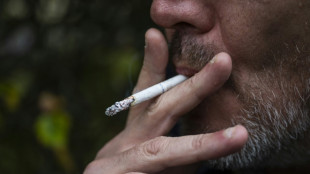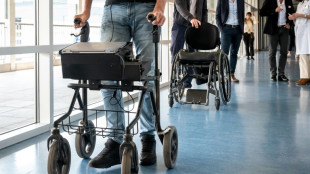
-
 Warhammer maker Games Workshop enters London's top stocks index
Warhammer maker Games Workshop enters London's top stocks index
-
Iran Nobel winner released for three weeks, 'unconditional' freedom urged

-
 Red Cross marks record numbers of humanitarians killed in 2024
Red Cross marks record numbers of humanitarians killed in 2024
-
Johnson's Grand Slam 'no threat', says World Athletics boss Coe

-
 Qatar's emir and UK's Starmer talk trade as state visit ends
Qatar's emir and UK's Starmer talk trade as state visit ends
-
Cuba suffers third nationwide blackout in two months

-
 Russia, Ukraine to send top diplomats to OSCE summit in Malta
Russia, Ukraine to send top diplomats to OSCE summit in Malta
-
Spanish royals to attend memorial service for flood victims

-
 LPGA, USGA new policy requires female at birth or pre-puberty change
LPGA, USGA new policy requires female at birth or pre-puberty change
-
Stick to current climate change laws, US tells top UN court

-
 British Museum chief says Marbles deal with Greece 'some distance' away
British Museum chief says Marbles deal with Greece 'some distance' away
-
Pope Francis receives electric popemobile from Mercedes

-
 Gaza civil defence: thousands flee Israeli strikes, evacuation calls
Gaza civil defence: thousands flee Israeli strikes, evacuation calls
-
Trump names billionaire private astronaut as next NASA chief

-
 Pidcock to leave INEOS Grenadiers at end of season
Pidcock to leave INEOS Grenadiers at end of season
-
Seoul stocks weaken, Paris advances despite political turmoil

-
 South America summit hopes to seal 'historic' trade deal with EU
South America summit hopes to seal 'historic' trade deal with EU
-
DAZN awarded global TV rights for Club World Cup

-
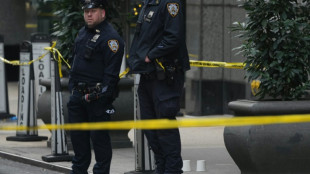 Top executive shot dead outside New York hotel
Top executive shot dead outside New York hotel
-
Vaping while still smoking unlikely to help quitters: study
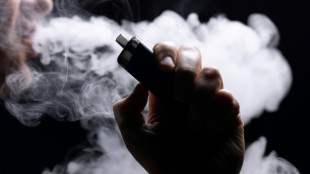
-
 British Museum chief says Parthenon Marbles deal with Greece 'some distance' away
British Museum chief says Parthenon Marbles deal with Greece 'some distance' away
-
'Creating connections': Arab, African filmmakers gather at Morocco workshops
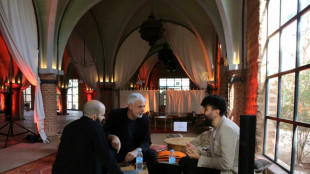
-
 Iran frees Nobel winner for three weeks, sparking calls for 'permanent' release
Iran frees Nobel winner for three weeks, sparking calls for 'permanent' release
-
Brazil's Minas cheese gets added to UNESCO list

-
 Top US executive shot dead in New York City: media
Top US executive shot dead in New York City: media
-
Trump's nominee to run Pentagon hangs by a thread

-
 GM announces more than $5 bn hit to earnings in China venture
GM announces more than $5 bn hit to earnings in China venture
-
World chess champ Ding, teen challenger tied past halfway mark

-
 Georgia police raid opposition offices as PM vows to curb protests
Georgia police raid opposition offices as PM vows to curb protests
-
S. Korea opposition begins push to impeach president

-
 Syrian army fights rebel offensive with counterattack
Syrian army fights rebel offensive with counterattack
-
France court upholds Polanski acquittal in defamation case
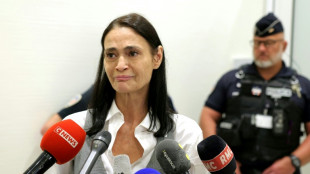
-
 UK bans daytime TV ads for cereals, muffins and burgers
UK bans daytime TV ads for cereals, muffins and burgers
-
Palace's Guehi to face no formal action over 'Jesus' message on rainbow armband

-
 UK faces trade balancing act with Trump, EU
UK faces trade balancing act with Trump, EU
-
Iran releases Nobel Peace laureate Mohammadi on medical leave: lawyer

-
 UNESCO grants heritage status to Aleppo soap as Syria war flares
UNESCO grants heritage status to Aleppo soap as Syria war flares
-
Ghana's illegal mining boom seeps into presidential election

-
 Inconsistent Spurs 'progressing in all aspects': Postecoglou
Inconsistent Spurs 'progressing in all aspects': Postecoglou
-
France's Orano says Niger junta controls uranium firm

-
 Seoul stocks weaken, Paris edges up tracking political turmoil
Seoul stocks weaken, Paris edges up tracking political turmoil
-
China reports warmest autumn since records began
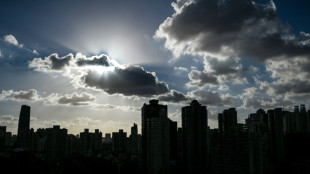
-
 French marine park to close over law banning killer whale shows
French marine park to close over law banning killer whale shows
-
Thousands march demanding S. Korea president resign over martial law debacle

-
 Taiwan romance novelist Chiung Yao dies at 86
Taiwan romance novelist Chiung Yao dies at 86
-
In Angola, Biden promises to invest differently to China

-
 Syrian army launches counteroffensive against rebels
Syrian army launches counteroffensive against rebels
-
Evenepoel says 'long journey' ahead after postal van collision

-
 South Korea's day of rage as Yoon's martial law founders
South Korea's day of rage as Yoon's martial law founders
-
UK police question killer nurse Letby over further baby deaths


Midwife on the frontline of climate change on Pakistan's islands
On a densely populated island off Pakistan's megacity of Karachi, a group of pregnant women wait in a punishing heatwave for the only midwife to arrive from the mainland.
Each week Neha Mankani comes by boat ambulance to Baba, an old fishing settlement and reportedly one of the world's most crowded islands with around 6,500 people crammed into 0.15 square kilometres (0.06 miles).
Climate change is swelling the surrounding seas and baking the land with rising temperatures. Until Mankani's ambulance launched last year, expectant mothers were marooned at the mercy of the elements.
At the gate of her island clinic waits 26-year-old Zainab Bibi, pregnant again after a second-trimester miscarriage last summer.
"It was a very hot day, I was not feeling well," she recalled. It took her husband hours of haggling with boat owners before one agreed to ferry them to the mainland -- but it was too late.
"By the time I delivered my baby in the hospital, she was already dead," she said.
- Summer heat hits pregnancies -
Heatwaves are becoming hotter, longer and more frequent in Pakistan, one of the countries most vulnerable to extreme weather conditions resulting from climate change.
In May and June, a string of heatwaves have seen temperatures top 52 degrees Celcius (126 degrees Fahrenheit) for days.
"Climate change doesn't affect everyone equally," 38-year-old Mankani told AFP during the 20-minute boat journey.
"Pregnant women and newborns, postpartum women are definitely more affected," she said.
"In the summer months, we see a real increase in low-birth weights, preterm births, and in pregnancy losses."
Women are at higher risk of stillbirth when exposed to temperatures above 90 percent of the normal range for their location, according to experts published in the British Journal of Obstetrics and Gynaecology last year.
"Before we didn't have the evidence, a lot of it was anecdotal," said Mankani. "But we've been seeing the impact of climate change for a while."
In Pakistan, 154 women die for every 100,000 live births -— a high maternal mortality rate shaped by socioeconomic status, barriers to healthcare access and limited decision-making powers, especially among young women, according to the United Nations.
Mankani began her 16-year career as a midwife in a Karachi hospital, where she worked at a high-risk ward, often treating women from the five islands dotted off the coast.
She founded the Mama Baby Fund in 2015 and set up the first clinics on the islands for expectant and new mothers. "Everyone opened their homes to us," she said.
The free 24/7 boat ambulance followed last year, crucially equipped to navigate rough seas in a region increasingly prone to flooding.
Sabira Rashid, 26, gave birth to a girl she named Eesha two months ago, following one stillbirth and a miscarriage at seven months -- painful losses she blames on not reaching the hospital in time.
"At the dock, they make us wait because they don't want to ferry only two or three people. They told us to wait for more passengers, no matter what the emergency," she said.
- Rising, dirty waters -
Girls on the impoverished islands are often wed as young as 16, with marriage considered the source of security for women in an area where polluted water is killing off the fishing trade.
"Most of these girls don't know how to take care of themselves, they get severe infections from the dirty water they are constantly exposed to," said Shahida Sumaar, an assistant at the clinic, wiping the sweat from her face.
The 45-year-old said basic advice is offered to young mothers during heatwaves, such as using dry, clean towels to wrap their newborns in, washing their breasts before feeding and staying hydrated.
But with no access to running water and little electricity, warding off heat stress is a challenge for all the islanders.
Women are at particular risk, typically responsible for cooking over open flames in small rooms with no fans or proper ventilation.
Ayesha Mansoor, 30, has four children and lives on the fringes of Baba, with just four to five hours of electricity a day.
The path to her home is covered by a carpet of discarded plastic bags which disappear underwater when the tide is high.
"Only those who have solar can deal better with the heat. We can't afford it," she said, swatting away flies that settled on her baby.
Mariam Abubakr, an 18-year-old assistant at the clinic who has grown up on the island, hopes to become its first full-time midwife.
"I used to wonder why we women didn't have any facilities here, a clinic that could just cater to us," she said.
"When Neha opened her clinic, I saw a way that I could help the women of my community."
E.Schubert--BTB

